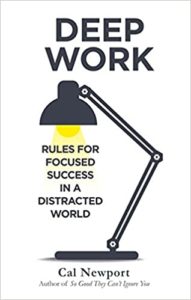Deep Work

I’ve been trying to be less distracted by the Internet while working. Stopping my instinct to open The Wire in a new tab while trying to debug something has been difficult, especially with news breaking as it has been in the last six months.
Knowing that focus is important for our work doesn’t always translate into us doing focussed work. This is because we constantly have the urge to turn our attention elsewhere. Deep Work by Cal Newport explains that if we didn’t have to use our willpower to resist urges we would yield better results. It goes on to suggest some strategies to achieve this.
Levels of deep work
The author offers different levels of deep work and notes that your mileage for this kind of work may vary.
Monastic: Maximise deep efforts by radically eliminating shallow obligations forever
Bimodal: Divide time clearly defined stretches of deep work and the rest for everything else. The scale of division could be anywhere between days to weeks, to months.
Rhythmic: Deep work as a regular habit combined with the chain (streak) method to make sure it is done consistently.
Journalistic: Rapidly switching between deep work and shallow work. Requires practice and confidence in abilities
Process
Ritualize: Decide when you’ll work for and for how long. Impose rules of distraction free work . Give yourself support in terms on nourishment and exercise. Experiment to figure out a ritual that works for you.
Execute: Lessons from the book titled The 4 Disciplines of Execution:
- Pick an ambitious goal and use that to drive focus
- Focus on and measure lead indicators
- Keep a score of the lead indicators. Use it to track progress and milestones.
- Review your scoreboard — celebrate successes and figure out how to ensure good days ahead.
Review: Take a look at your email and respond to anything urgent. Transfer tasks and ideas from your brain into your todo and notes. Review your calendar and make a rough plan for the next day/week.
Rest: Once work is over for the day (or the week) completely shutdown work thinking. This helps the brain consciously work on insights and get time to recharge.
Some other strategies that the author suggests are:
Grand gestures: Leverage a radical change in environment, possibly linked with an investment of time and money to increase the perceived importance of the task. For eg, booking a hotel for two days to finish the project you’ve been working on.
Collaborate: Leverage the whiteboard effect where you work side-by-side with someone on a problem, and both push each other toward deeper levels of work.
Finally, it’s important to remember that our focus improves as we practice it more. Like meditation, as we focus our attention on just the task at hand we become more used to working this way.